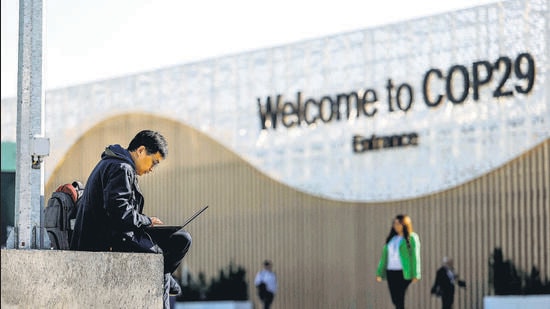COP29 talks extended as draft $250 billion finance offer flops
Brazil warned the inadequate funding could jeopardise next year’s critical climate commitments.
Baku: The COP29 climate summit was extended by a day after developing nations reacted with fury to developed countries’ proposal of $250 billion annual climate finance by 2035, calling it “a slap in the face” and far below their demand of $1.3 trillion, raising fears of a Copenhagen-like deadlock.

The first concrete numbers to emerge in the two-week negotiations came in Friday’s draft from the COP29 presidency, which not only set a dramatically lower funding target but also controversially modified language around developed nations’ obligations, suggesting they would merely “take the lead” rather than fully provide climate finance.
The draft proposes sourcing funds from “public and private, bilateral and multilateral, and alternative sources”, while mentioning a broader but largely symbolic target of “all actors” mobilising $1.3 trillion annually by 2035.
“The quantum is an eyewash,” said a developing country negotiator, noting the draft’s deviation from Article 9.1 of the Paris Agreement, which mandates developed countries to provide climate finance.
Despite an early agreement on carbon markets, the summit risks ending without consensus on its central issue, echoing the controversial Copenhagen summit of 2009 where a similar “take it or leave it” approach to climate finance created lasting distrust.
The COP29 Presidency urged parties to study the “balanced and streamlined” text, but observers say bridging the deep divisions over both quantum and structure of climate finance remains challenging as talks entered overtime, with another draft due on Saturday morning.
Brazil warned the inadequate funding could jeopardise next year’s critical climate commitments. “We have decided to align our NDCs to 1.5 degree C goal. But with question on means of implementation now, NDCs will be impacted,” said Marina D Silva, Brazil’s environment minister, highlighting concerns about COP30 in Brazil where countries are supposed to update their climate pledges.
Brazil’s concerns underscore a critical link between finance and climate action. “At COP30 in Brazil, parties are supposed to update NDCs to keep warming within 1.5 degree C warming,” Silva emphasised, expressing worry that without adequate finance commitments in Baku, countries may be unable or unwilling to enhance their climate pledges next year in Belem.
The Independent High-Level Expert Group on Climate Finance has provided a detailed roadmap, calling for “stepped up direct bilateral finance from developed countries, much higher ambition on the part of the multilateral development banks, and improved private finance mobilisation.” Their analysis suggests the proposed $250 billion falls significantly short of what’s needed to meet Paris Agreement goals.
Leading climate finance experts Amar Bhattacharya, Vera Songwe and Nicholas Stern stated the figure “is too low and not consistent with delivery of the Paris Agreement,” recommending instead “at least $300 billion per year by 2030, and $390 billion per year by 2035.”
Experts also pointed out that if inflation is accounted for, over the next 10 years till 2035, the $250 billion would be equivalent to the $100 billion goal that expires in 2025.
“Even the apparent increase in the provision from developed world to developing world of $250 billion annually by 2035 is the same as the $100 billion by 2020 if 6% annual average inflation is accounted for. There is no grant or low-cost finance component. This is a bad deal for the developing world, irrespective of how it is going to be portrayed by the presidency,” explained Vaibhav Chaturvedi of CEEW.
Notably absent from the draft texts on NCQG and Mitigation Work Programme is any reference to “transitioning away from fossil fuels,” which was a key agreement at COP28 in Dubai. This omission, combined with the lower finance figures, has raised concerns about backsliding on previous commitments.
“Our expectations were low, but this is a slap in the face,” said Mohamed Adow from Power Shift Africa, while Meena Raman of Third World Network questioned how a “finance COP” could move backwards on Paris Agreement commitments.
RR Rashmi from TERI called it “a highly compromised version of the goal” that weakens core finance obligations by diluting government responsibilities and relying heavily on private funds.
The United States appeared satisfied with the text, with a senior official noting the “significant lift” required to meet even this target. The US stance gains importance given Donald Trump’s election victory and his expected withdrawal from the Paris agreement, which calls on countries to make efforts to limit global warming to 2°C above pre-industrial (and preferably to 1.5°C).
On expanding the contributor base, Li Shuo from China Climate Hub Asia Society suggested a compromise where countries like China could contribute toward the $250 billion goal without being formally responsible for it.
“We cannot leave Baku without this,” Brazil’s Silva emphasised, referring to the expert group’s recommended funding levels, warning that countries may not update their climate pledges next year without clear finance provisions.
See more
- Paris Agreement
